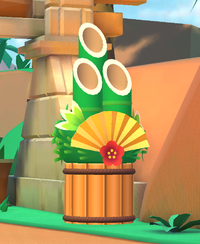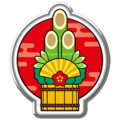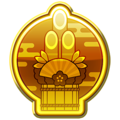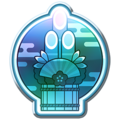Kadomatsu: Difference between revisions
mNo edit summary |
Tag: Undo |
||
| Line 3: | Line 3: | ||
'''{{wp|Kadomatsu}}''' are traditional Japanese New Year decorations that are said to attract good luck. They consist of several tree cuttings, mainly bamboo stalks and pines, bound together with straw rope. They appeared in every course of the 2020 [[New Year's Tour]] in ''[[Mario Kart Tour]]'' and are similar in function to the [[festive tree]]s that appeared in prior tours. However, they were removed from the game at the end of the New Year's Tour, but they were brought back in the [[New Year's 2021 Tour]] and the [[New Year's 2022 Tour]] starting from January. | '''{{wp|Kadomatsu}}''' are traditional Japanese New Year decorations that are said to attract good luck. They consist of several tree cuttings, mainly bamboo stalks and pines, bound together with straw rope. They appeared in every course of the 2020 [[New Year's Tour]] in ''[[Mario Kart Tour]]'' and are similar in function to the [[festive tree]]s that appeared in prior tours. However, they were removed from the game at the end of the New Year's Tour, but they were brought back in the [[New Year's 2021 Tour]] and the [[New Year's 2022 Tour]] starting from January. | ||
Kadomatsu are placed around arches, entrances and [[Finish Line (object)|finish lines]] and are usually colored white with a single Japanese character. When a driver gets near a kadomatsu, they can hear a dulcimer. In the 2020 New Year's Tour and the New Year's 2022 Tour, kadomatsu bounced and gave bonus points when hit with an offensive item or when driven into while [[Invincible Mario|invincible]] or [[Mega Mario|Mega]], with the action being displayed as "Happy New Year!", and it also | Kadomatsu are placed around arches, entrances and [[Finish Line (object)|finish lines]] and are usually colored white with a single Japanese character. When a driver gets near a kadomatsu, they can hear a dulcimer. In the 2020 New Year's Tour and the New Year's 2022 Tour, kadomatsu bounced and gave bonus points when hit with an offensive item or when driven into while [[Invincible Mario|invincible]] or [[Mega Mario|Mega]], with the action being displayed as "Happy New Year!", and it also gave an [[event token]] in the New Year's 2022 Tour. Hitting a kadomatsu in the New Year's 2021 Tour did not grant bonus points, display the action, or give event tokens. | ||
==Profiles== | ==Profiles== | ||
Revision as of 00:03, January 13, 2022

Kadomatsu are traditional Japanese New Year decorations that are said to attract good luck. They consist of several tree cuttings, mainly bamboo stalks and pines, bound together with straw rope. They appeared in every course of the 2020 New Year's Tour in Mario Kart Tour and are similar in function to the festive trees that appeared in prior tours. However, they were removed from the game at the end of the New Year's Tour, but they were brought back in the New Year's 2021 Tour and the New Year's 2022 Tour starting from January.
Kadomatsu are placed around arches, entrances and finish lines and are usually colored white with a single Japanese character. When a driver gets near a kadomatsu, they can hear a dulcimer. In the 2020 New Year's Tour and the New Year's 2022 Tour, kadomatsu bounced and gave bonus points when hit with an offensive item or when driven into while invincible or Mega, with the action being displayed as "Happy New Year!", and it also gave an event token in the New Year's 2022 Tour. Hitting a kadomatsu in the New Year's 2021 Tour did not grant bonus points, display the action, or give event tokens.
Profiles
Mario Kart Tour
- Mario Kart Tour Twitter: "Japan's most famous city is back for for another lap with the Tokyo Blur 2 course. Those traditional kadomatsu decorations aren't just for show—hitting them with an item is a great way to rack up some extra points!"[1]
Gallery
A common badge depicting a kadomatsu
The Today's Challenge badge of the New Year's 2022 Tour depicting a kadomatsu
Names in other languages
| Language | Name | Meaning | Notes |
|---|---|---|---|
| Chinese (simplified) | 门松[?] Ménsōng |
Kadomatsu | |
| Chinese (traditional) | 門松[?] Ménsōng |
Kadomatsu |


